Business Law: Analysis of Contractual Agreements and Tenders
VerifiedAdded on 2022/08/25
|8
|1787
|16
Report
AI Summary
This business law report examines a scenario involving Aztral-Tech, a company that issued invitations for tenders to construction companies. The report analyzes the legal implications of the bids submitted by Bram Construction and Cooley Construction, considering deadlines and the concept of an 'invitation to treat.' It applies relevant case law, including Smith v Hughes and Blackpool and Fylde Aero Club v Blackpool BC, to determine whether binding contracts were formed. Additionally, the report explores the contractual relationship between Aztral-Tech and Devo-Supply, focusing on the terms of the agreement and the implications of the seller's standard terms. The analysis considers the elements of offer, acceptance, and consideration, and the intention to create legal relations. The report concludes by determining the validity of the contracts and the obligations of each party involved, including the potential for damages.
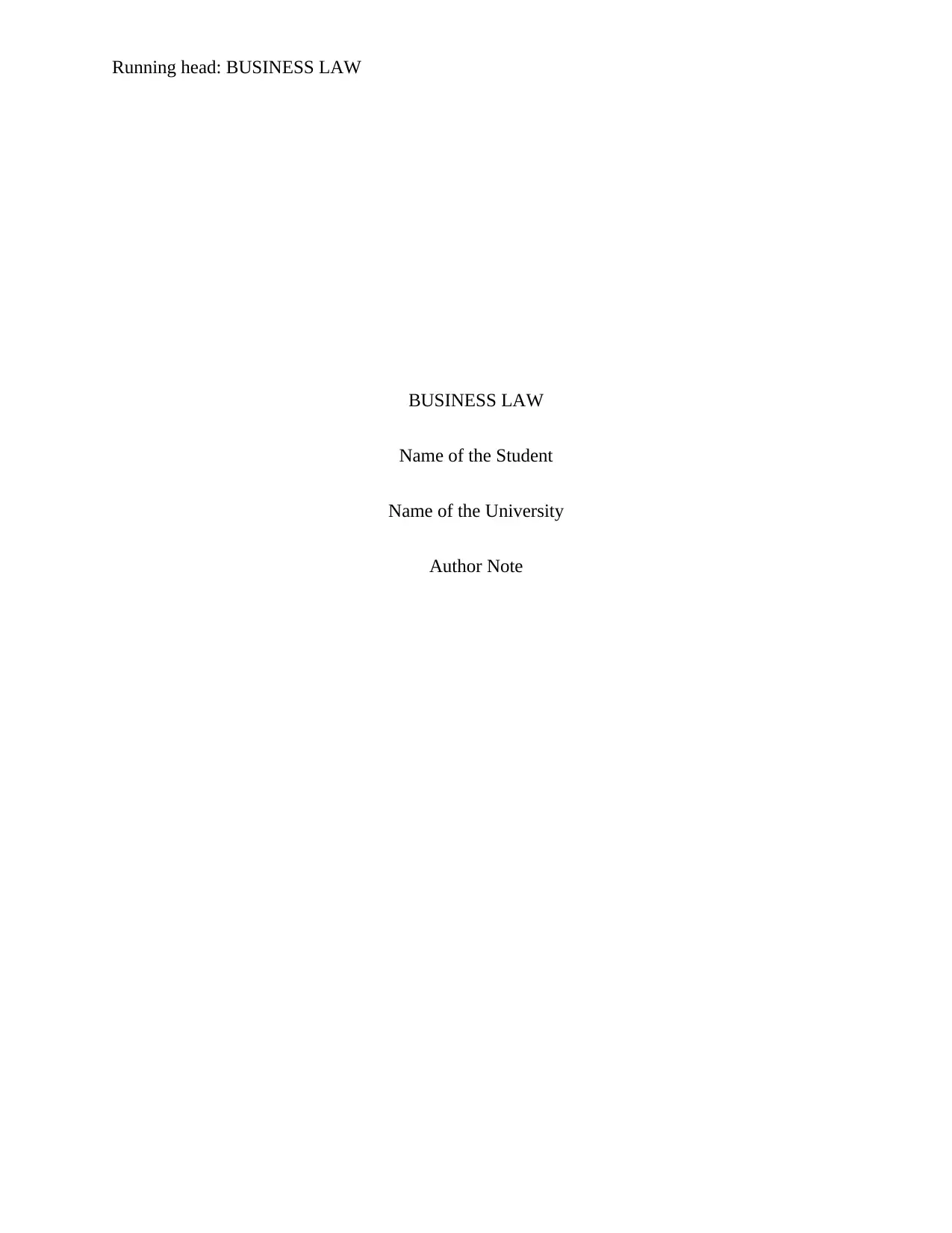
Running head: BUSINESS LAW
BUSINESS LAW
Name of the Student
Name of the University
Author Note
BUSINESS LAW
Name of the Student
Name of the University
Author Note
Paraphrase This Document
Need a fresh take? Get an instant paraphrase of this document with our AI Paraphraser
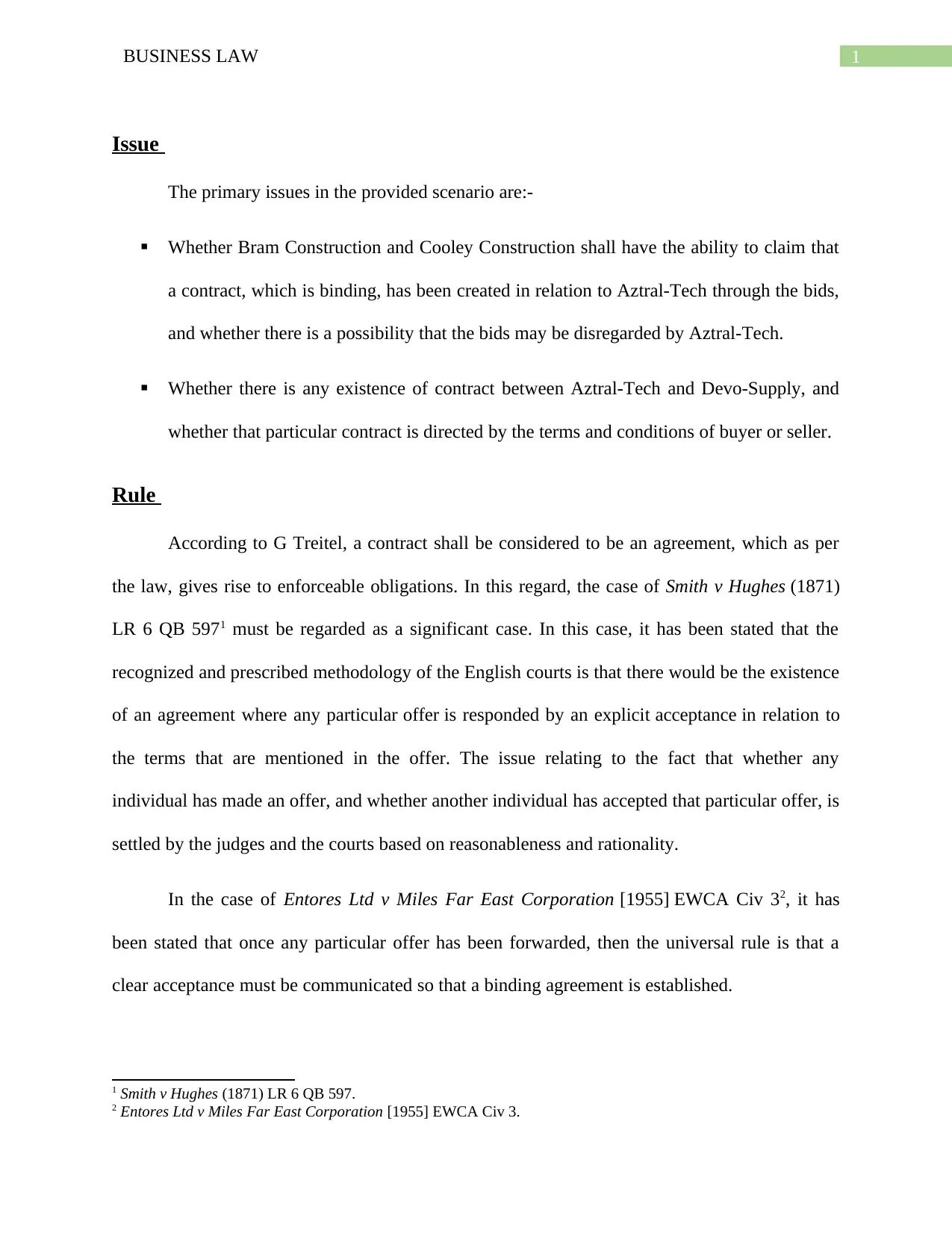
1BUSINESS LAW
Issue
The primary issues in the provided scenario are:-
Whether Bram Construction and Cooley Construction shall have the ability to claim that
a contract, which is binding, has been created in relation to Aztral-Tech through the bids,
and whether there is a possibility that the bids may be disregarded by Aztral-Tech.
Whether there is any existence of contract between Aztral-Tech and Devo-Supply, and
whether that particular contract is directed by the terms and conditions of buyer or seller.
Rule
According to G Treitel, a contract shall be considered to be an agreement, which as per
the law, gives rise to enforceable obligations. In this regard, the case of Smith v Hughes (1871)
LR 6 QB 5971 must be regarded as a significant case. In this case, it has been stated that the
recognized and prescribed methodology of the English courts is that there would be the existence
of an agreement where any particular offer is responded by an explicit acceptance in relation to
the terms that are mentioned in the offer. The issue relating to the fact that whether any
individual has made an offer, and whether another individual has accepted that particular offer, is
settled by the judges and the courts based on reasonableness and rationality.
In the case of Entores Ltd v Miles Far East Corporation [1955] EWCA Civ 32, it has
been stated that once any particular offer has been forwarded, then the universal rule is that a
clear acceptance must be communicated so that a binding agreement is established.
1 Smith v Hughes (1871) LR 6 QB 597.
2 Entores Ltd v Miles Far East Corporation [1955] EWCA Civ 3.
Issue
The primary issues in the provided scenario are:-
Whether Bram Construction and Cooley Construction shall have the ability to claim that
a contract, which is binding, has been created in relation to Aztral-Tech through the bids,
and whether there is a possibility that the bids may be disregarded by Aztral-Tech.
Whether there is any existence of contract between Aztral-Tech and Devo-Supply, and
whether that particular contract is directed by the terms and conditions of buyer or seller.
Rule
According to G Treitel, a contract shall be considered to be an agreement, which as per
the law, gives rise to enforceable obligations. In this regard, the case of Smith v Hughes (1871)
LR 6 QB 5971 must be regarded as a significant case. In this case, it has been stated that the
recognized and prescribed methodology of the English courts is that there would be the existence
of an agreement where any particular offer is responded by an explicit acceptance in relation to
the terms that are mentioned in the offer. The issue relating to the fact that whether any
individual has made an offer, and whether another individual has accepted that particular offer, is
settled by the judges and the courts based on reasonableness and rationality.
In the case of Entores Ltd v Miles Far East Corporation [1955] EWCA Civ 32, it has
been stated that once any particular offer has been forwarded, then the universal rule is that a
clear acceptance must be communicated so that a binding agreement is established.
1 Smith v Hughes (1871) LR 6 QB 597.
2 Entores Ltd v Miles Far East Corporation [1955] EWCA Civ 3.
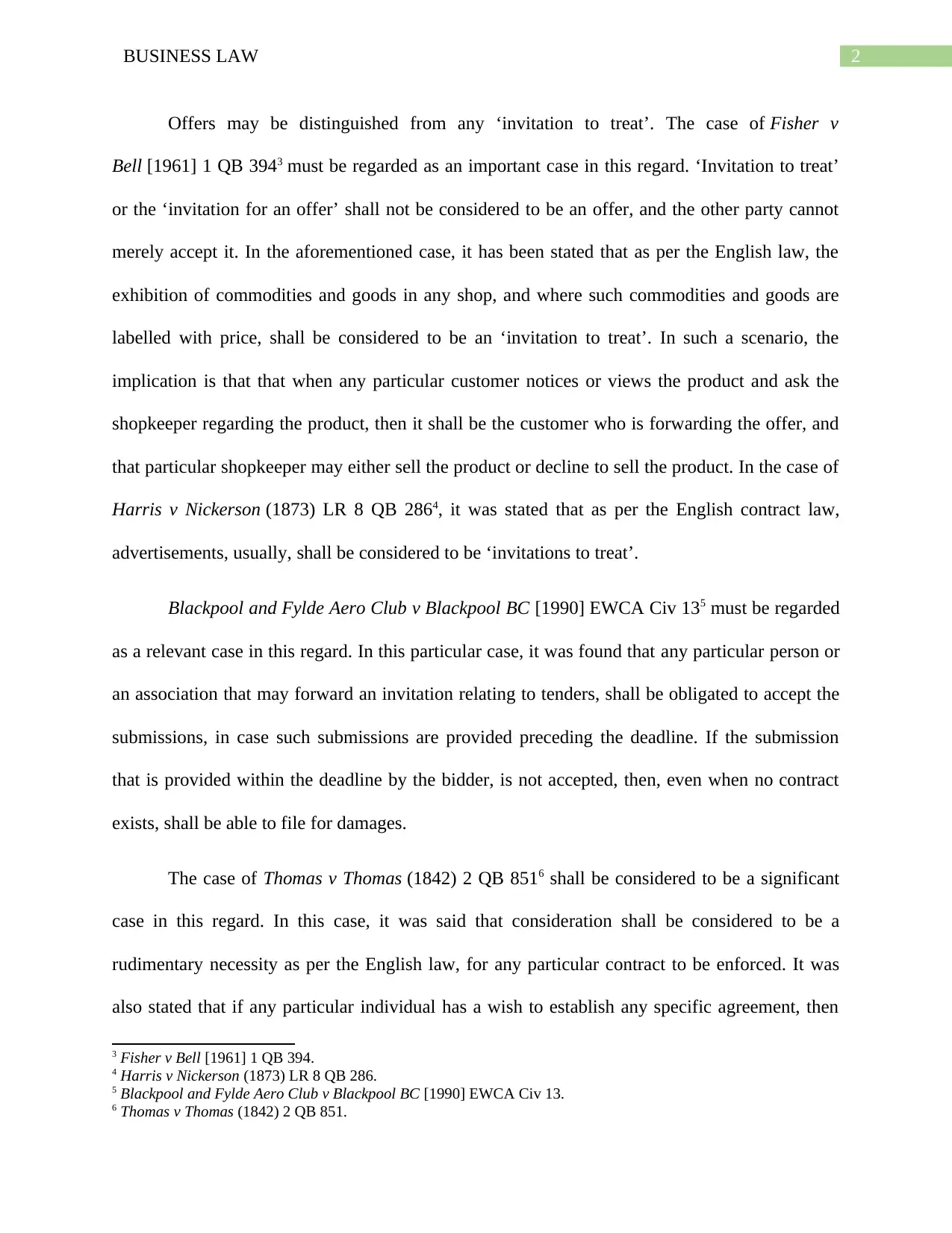
2BUSINESS LAW
Offers may be distinguished from any ‘invitation to treat’. The case of Fisher v
Bell [1961] 1 QB 3943 must be regarded as an important case in this regard. ‘Invitation to treat’
or the ‘invitation for an offer’ shall not be considered to be an offer, and the other party cannot
merely accept it. In the aforementioned case, it has been stated that as per the English law, the
exhibition of commodities and goods in any shop, and where such commodities and goods are
labelled with price, shall be considered to be an ‘invitation to treat’. In such a scenario, the
implication is that that when any particular customer notices or views the product and ask the
shopkeeper regarding the product, then it shall be the customer who is forwarding the offer, and
that particular shopkeeper may either sell the product or decline to sell the product. In the case of
Harris v Nickerson (1873) LR 8 QB 2864, it was stated that as per the English contract law,
advertisements, usually, shall be considered to be ‘invitations to treat’.
Blackpool and Fylde Aero Club v Blackpool BC [1990] EWCA Civ 135 must be regarded
as a relevant case in this regard. In this particular case, it was found that any particular person or
an association that may forward an invitation relating to tenders, shall be obligated to accept the
submissions, in case such submissions are provided preceding the deadline. If the submission
that is provided within the deadline by the bidder, is not accepted, then, even when no contract
exists, shall be able to file for damages.
The case of Thomas v Thomas (1842) 2 QB 8516 shall be considered to be a significant
case in this regard. In this case, it was said that consideration shall be considered to be a
rudimentary necessity as per the English law, for any particular contract to be enforced. It was
also stated that if any particular individual has a wish to establish any specific agreement, then
3 Fisher v Bell [1961] 1 QB 394.
4 Harris v Nickerson (1873) LR 8 QB 286.
5 Blackpool and Fylde Aero Club v Blackpool BC [1990] EWCA Civ 13.
6 Thomas v Thomas (1842) 2 QB 851.
Offers may be distinguished from any ‘invitation to treat’. The case of Fisher v
Bell [1961] 1 QB 3943 must be regarded as an important case in this regard. ‘Invitation to treat’
or the ‘invitation for an offer’ shall not be considered to be an offer, and the other party cannot
merely accept it. In the aforementioned case, it has been stated that as per the English law, the
exhibition of commodities and goods in any shop, and where such commodities and goods are
labelled with price, shall be considered to be an ‘invitation to treat’. In such a scenario, the
implication is that that when any particular customer notices or views the product and ask the
shopkeeper regarding the product, then it shall be the customer who is forwarding the offer, and
that particular shopkeeper may either sell the product or decline to sell the product. In the case of
Harris v Nickerson (1873) LR 8 QB 2864, it was stated that as per the English contract law,
advertisements, usually, shall be considered to be ‘invitations to treat’.
Blackpool and Fylde Aero Club v Blackpool BC [1990] EWCA Civ 135 must be regarded
as a relevant case in this regard. In this particular case, it was found that any particular person or
an association that may forward an invitation relating to tenders, shall be obligated to accept the
submissions, in case such submissions are provided preceding the deadline. If the submission
that is provided within the deadline by the bidder, is not accepted, then, even when no contract
exists, shall be able to file for damages.
The case of Thomas v Thomas (1842) 2 QB 8516 shall be considered to be a significant
case in this regard. In this case, it was said that consideration shall be considered to be a
rudimentary necessity as per the English law, for any particular contract to be enforced. It was
also stated that if any particular individual has a wish to establish any specific agreement, then
3 Fisher v Bell [1961] 1 QB 394.
4 Harris v Nickerson (1873) LR 8 QB 286.
5 Blackpool and Fylde Aero Club v Blackpool BC [1990] EWCA Civ 13.
6 Thomas v Thomas (1842) 2 QB 851.
⊘ This is a preview!⊘
Do you want full access?
Subscribe today to unlock all pages.

Trusted by 1+ million students worldwide
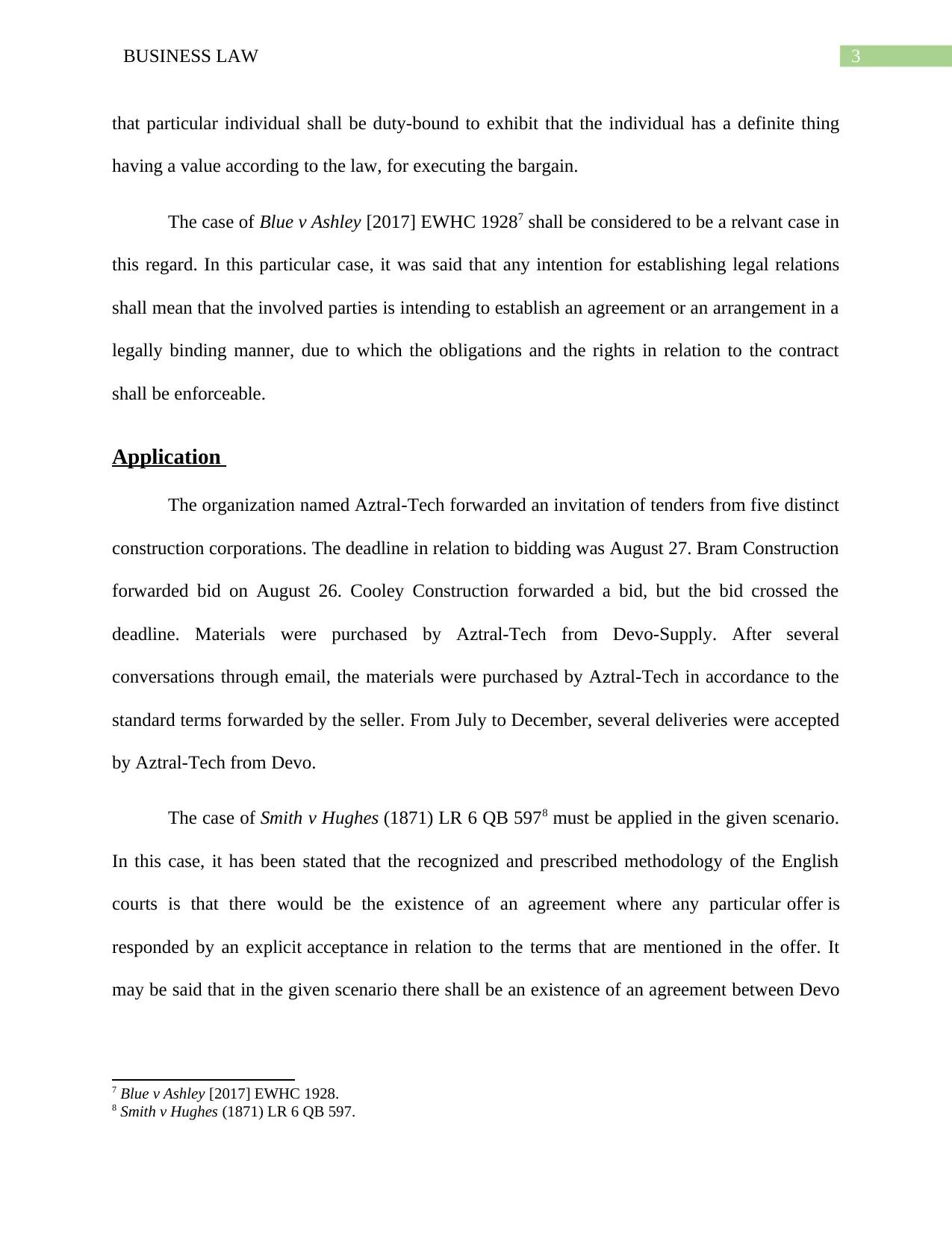
3BUSINESS LAW
that particular individual shall be duty-bound to exhibit that the individual has a definite thing
having a value according to the law, for executing the bargain.
The case of Blue v Ashley [2017] EWHC 19287 shall be considered to be a relvant case in
this regard. In this particular case, it was said that any intention for establishing legal relations
shall mean that the involved parties is intending to establish an agreement or an arrangement in a
legally binding manner, due to which the obligations and the rights in relation to the contract
shall be enforceable.
Application
The organization named Aztral-Tech forwarded an invitation of tenders from five distinct
construction corporations. The deadline in relation to bidding was August 27. Bram Construction
forwarded bid on August 26. Cooley Construction forwarded a bid, but the bid crossed the
deadline. Materials were purchased by Aztral-Tech from Devo-Supply. After several
conversations through email, the materials were purchased by Aztral-Tech in accordance to the
standard terms forwarded by the seller. From July to December, several deliveries were accepted
by Aztral-Tech from Devo.
The case of Smith v Hughes (1871) LR 6 QB 5978 must be applied in the given scenario.
In this case, it has been stated that the recognized and prescribed methodology of the English
courts is that there would be the existence of an agreement where any particular offer is
responded by an explicit acceptance in relation to the terms that are mentioned in the offer. It
may be said that in the given scenario there shall be an existence of an agreement between Devo
7 Blue v Ashley [2017] EWHC 1928.
8 Smith v Hughes (1871) LR 6 QB 597.
that particular individual shall be duty-bound to exhibit that the individual has a definite thing
having a value according to the law, for executing the bargain.
The case of Blue v Ashley [2017] EWHC 19287 shall be considered to be a relvant case in
this regard. In this particular case, it was said that any intention for establishing legal relations
shall mean that the involved parties is intending to establish an agreement or an arrangement in a
legally binding manner, due to which the obligations and the rights in relation to the contract
shall be enforceable.
Application
The organization named Aztral-Tech forwarded an invitation of tenders from five distinct
construction corporations. The deadline in relation to bidding was August 27. Bram Construction
forwarded bid on August 26. Cooley Construction forwarded a bid, but the bid crossed the
deadline. Materials were purchased by Aztral-Tech from Devo-Supply. After several
conversations through email, the materials were purchased by Aztral-Tech in accordance to the
standard terms forwarded by the seller. From July to December, several deliveries were accepted
by Aztral-Tech from Devo.
The case of Smith v Hughes (1871) LR 6 QB 5978 must be applied in the given scenario.
In this case, it has been stated that the recognized and prescribed methodology of the English
courts is that there would be the existence of an agreement where any particular offer is
responded by an explicit acceptance in relation to the terms that are mentioned in the offer. It
may be said that in the given scenario there shall be an existence of an agreement between Devo
7 Blue v Ashley [2017] EWHC 1928.
8 Smith v Hughes (1871) LR 6 QB 597.
Paraphrase This Document
Need a fresh take? Get an instant paraphrase of this document with our AI Paraphraser
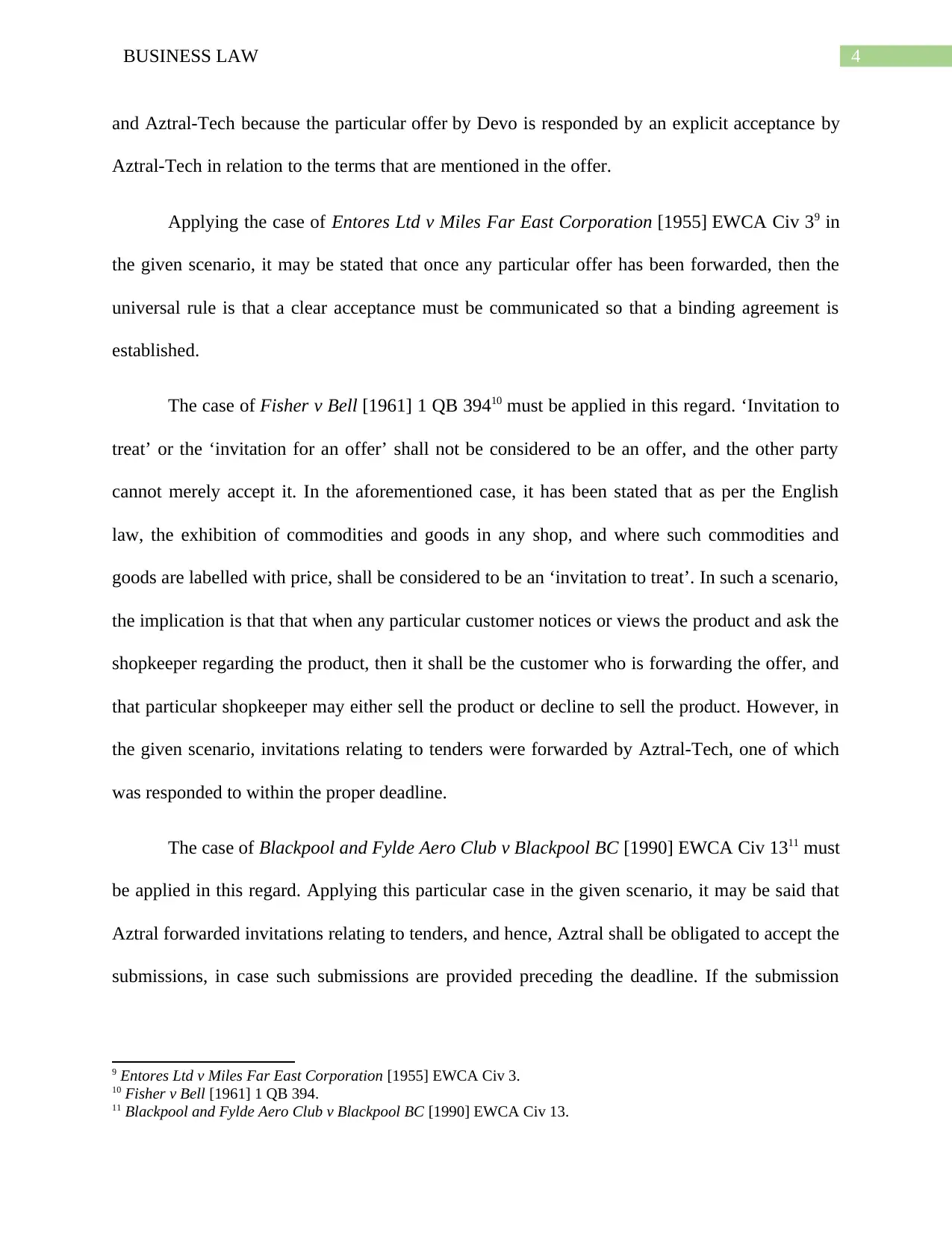
4BUSINESS LAW
and Aztral-Tech because the particular offer by Devo is responded by an explicit acceptance by
Aztral-Tech in relation to the terms that are mentioned in the offer.
Applying the case of Entores Ltd v Miles Far East Corporation [1955] EWCA Civ 39 in
the given scenario, it may be stated that once any particular offer has been forwarded, then the
universal rule is that a clear acceptance must be communicated so that a binding agreement is
established.
The case of Fisher v Bell [1961] 1 QB 39410 must be applied in this regard. ‘Invitation to
treat’ or the ‘invitation for an offer’ shall not be considered to be an offer, and the other party
cannot merely accept it. In the aforementioned case, it has been stated that as per the English
law, the exhibition of commodities and goods in any shop, and where such commodities and
goods are labelled with price, shall be considered to be an ‘invitation to treat’. In such a scenario,
the implication is that that when any particular customer notices or views the product and ask the
shopkeeper regarding the product, then it shall be the customer who is forwarding the offer, and
that particular shopkeeper may either sell the product or decline to sell the product. However, in
the given scenario, invitations relating to tenders were forwarded by Aztral-Tech, one of which
was responded to within the proper deadline.
The case of Blackpool and Fylde Aero Club v Blackpool BC [1990] EWCA Civ 1311 must
be applied in this regard. Applying this particular case in the given scenario, it may be said that
Aztral forwarded invitations relating to tenders, and hence, Aztral shall be obligated to accept the
submissions, in case such submissions are provided preceding the deadline. If the submission
9 Entores Ltd v Miles Far East Corporation [1955] EWCA Civ 3.
10 Fisher v Bell [1961] 1 QB 394.
11 Blackpool and Fylde Aero Club v Blackpool BC [1990] EWCA Civ 13.
and Aztral-Tech because the particular offer by Devo is responded by an explicit acceptance by
Aztral-Tech in relation to the terms that are mentioned in the offer.
Applying the case of Entores Ltd v Miles Far East Corporation [1955] EWCA Civ 39 in
the given scenario, it may be stated that once any particular offer has been forwarded, then the
universal rule is that a clear acceptance must be communicated so that a binding agreement is
established.
The case of Fisher v Bell [1961] 1 QB 39410 must be applied in this regard. ‘Invitation to
treat’ or the ‘invitation for an offer’ shall not be considered to be an offer, and the other party
cannot merely accept it. In the aforementioned case, it has been stated that as per the English
law, the exhibition of commodities and goods in any shop, and where such commodities and
goods are labelled with price, shall be considered to be an ‘invitation to treat’. In such a scenario,
the implication is that that when any particular customer notices or views the product and ask the
shopkeeper regarding the product, then it shall be the customer who is forwarding the offer, and
that particular shopkeeper may either sell the product or decline to sell the product. However, in
the given scenario, invitations relating to tenders were forwarded by Aztral-Tech, one of which
was responded to within the proper deadline.
The case of Blackpool and Fylde Aero Club v Blackpool BC [1990] EWCA Civ 1311 must
be applied in this regard. Applying this particular case in the given scenario, it may be said that
Aztral forwarded invitations relating to tenders, and hence, Aztral shall be obligated to accept the
submissions, in case such submissions are provided preceding the deadline. If the submission
9 Entores Ltd v Miles Far East Corporation [1955] EWCA Civ 3.
10 Fisher v Bell [1961] 1 QB 394.
11 Blackpool and Fylde Aero Club v Blackpool BC [1990] EWCA Civ 13.
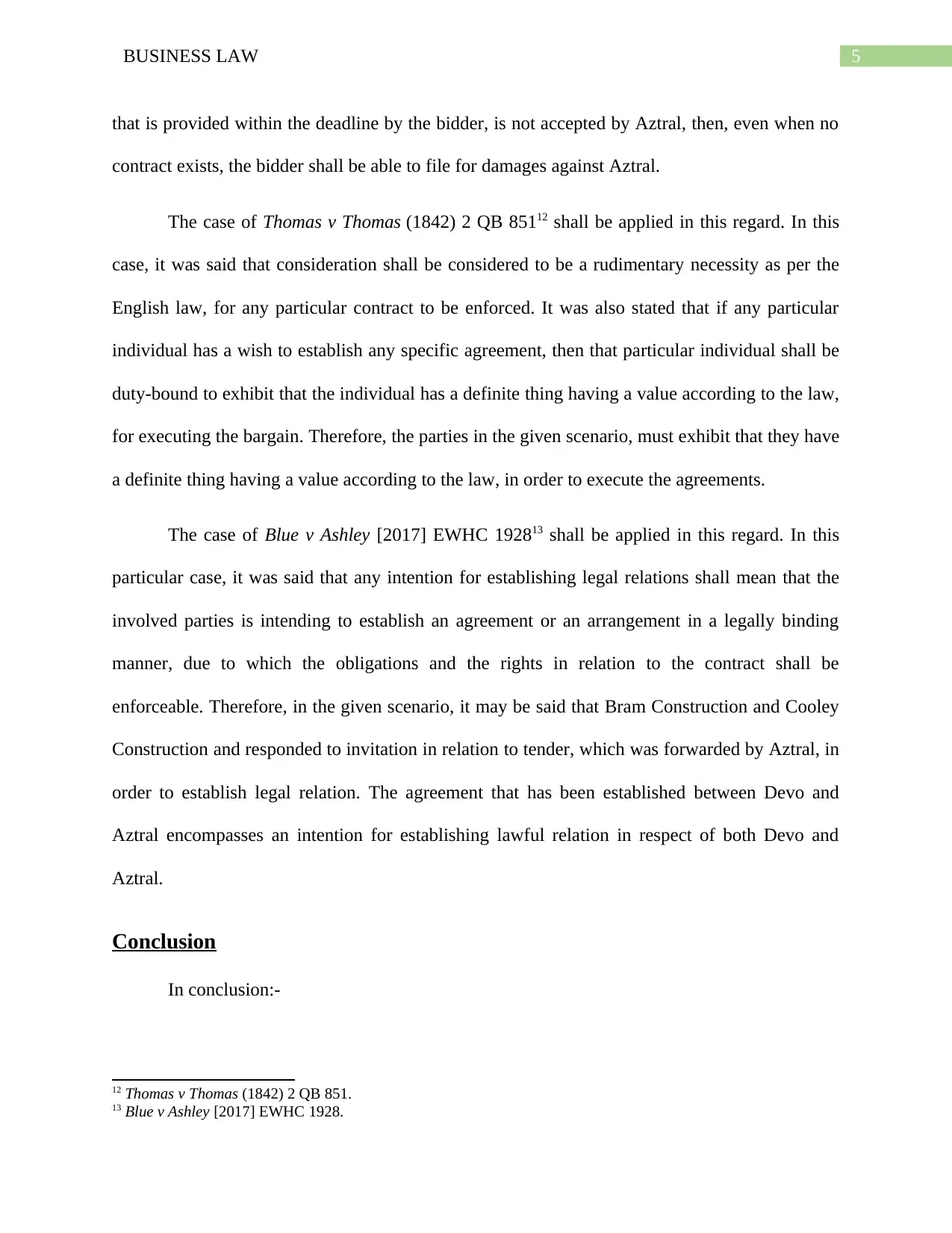
5BUSINESS LAW
that is provided within the deadline by the bidder, is not accepted by Aztral, then, even when no
contract exists, the bidder shall be able to file for damages against Aztral.
The case of Thomas v Thomas (1842) 2 QB 85112 shall be applied in this regard. In this
case, it was said that consideration shall be considered to be a rudimentary necessity as per the
English law, for any particular contract to be enforced. It was also stated that if any particular
individual has a wish to establish any specific agreement, then that particular individual shall be
duty-bound to exhibit that the individual has a definite thing having a value according to the law,
for executing the bargain. Therefore, the parties in the given scenario, must exhibit that they have
a definite thing having a value according to the law, in order to execute the agreements.
The case of Blue v Ashley [2017] EWHC 192813 shall be applied in this regard. In this
particular case, it was said that any intention for establishing legal relations shall mean that the
involved parties is intending to establish an agreement or an arrangement in a legally binding
manner, due to which the obligations and the rights in relation to the contract shall be
enforceable. Therefore, in the given scenario, it may be said that Bram Construction and Cooley
Construction and responded to invitation in relation to tender, which was forwarded by Aztral, in
order to establish legal relation. The agreement that has been established between Devo and
Aztral encompasses an intention for establishing lawful relation in respect of both Devo and
Aztral.
Conclusion
In conclusion:-
12 Thomas v Thomas (1842) 2 QB 851.
13 Blue v Ashley [2017] EWHC 1928.
that is provided within the deadline by the bidder, is not accepted by Aztral, then, even when no
contract exists, the bidder shall be able to file for damages against Aztral.
The case of Thomas v Thomas (1842) 2 QB 85112 shall be applied in this regard. In this
case, it was said that consideration shall be considered to be a rudimentary necessity as per the
English law, for any particular contract to be enforced. It was also stated that if any particular
individual has a wish to establish any specific agreement, then that particular individual shall be
duty-bound to exhibit that the individual has a definite thing having a value according to the law,
for executing the bargain. Therefore, the parties in the given scenario, must exhibit that they have
a definite thing having a value according to the law, in order to execute the agreements.
The case of Blue v Ashley [2017] EWHC 192813 shall be applied in this regard. In this
particular case, it was said that any intention for establishing legal relations shall mean that the
involved parties is intending to establish an agreement or an arrangement in a legally binding
manner, due to which the obligations and the rights in relation to the contract shall be
enforceable. Therefore, in the given scenario, it may be said that Bram Construction and Cooley
Construction and responded to invitation in relation to tender, which was forwarded by Aztral, in
order to establish legal relation. The agreement that has been established between Devo and
Aztral encompasses an intention for establishing lawful relation in respect of both Devo and
Aztral.
Conclusion
In conclusion:-
12 Thomas v Thomas (1842) 2 QB 851.
13 Blue v Ashley [2017] EWHC 1928.
⊘ This is a preview!⊘
Do you want full access?
Subscribe today to unlock all pages.

Trusted by 1+ million students worldwide
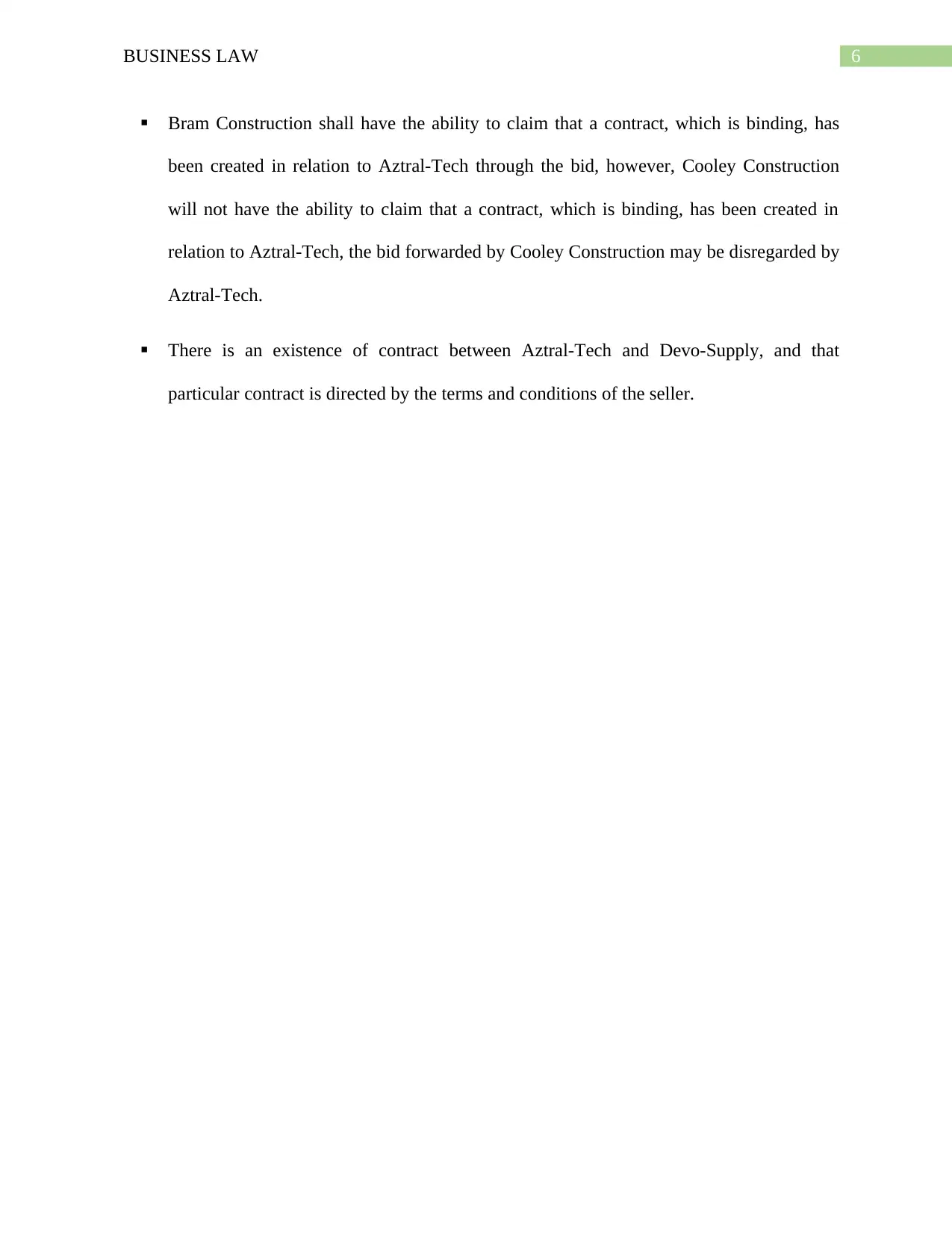
6BUSINESS LAW
Bram Construction shall have the ability to claim that a contract, which is binding, has
been created in relation to Aztral-Tech through the bid, however, Cooley Construction
will not have the ability to claim that a contract, which is binding, has been created in
relation to Aztral-Tech, the bid forwarded by Cooley Construction may be disregarded by
Aztral-Tech.
There is an existence of contract between Aztral-Tech and Devo-Supply, and that
particular contract is directed by the terms and conditions of the seller.
Bram Construction shall have the ability to claim that a contract, which is binding, has
been created in relation to Aztral-Tech through the bid, however, Cooley Construction
will not have the ability to claim that a contract, which is binding, has been created in
relation to Aztral-Tech, the bid forwarded by Cooley Construction may be disregarded by
Aztral-Tech.
There is an existence of contract between Aztral-Tech and Devo-Supply, and that
particular contract is directed by the terms and conditions of the seller.
Paraphrase This Document
Need a fresh take? Get an instant paraphrase of this document with our AI Paraphraser
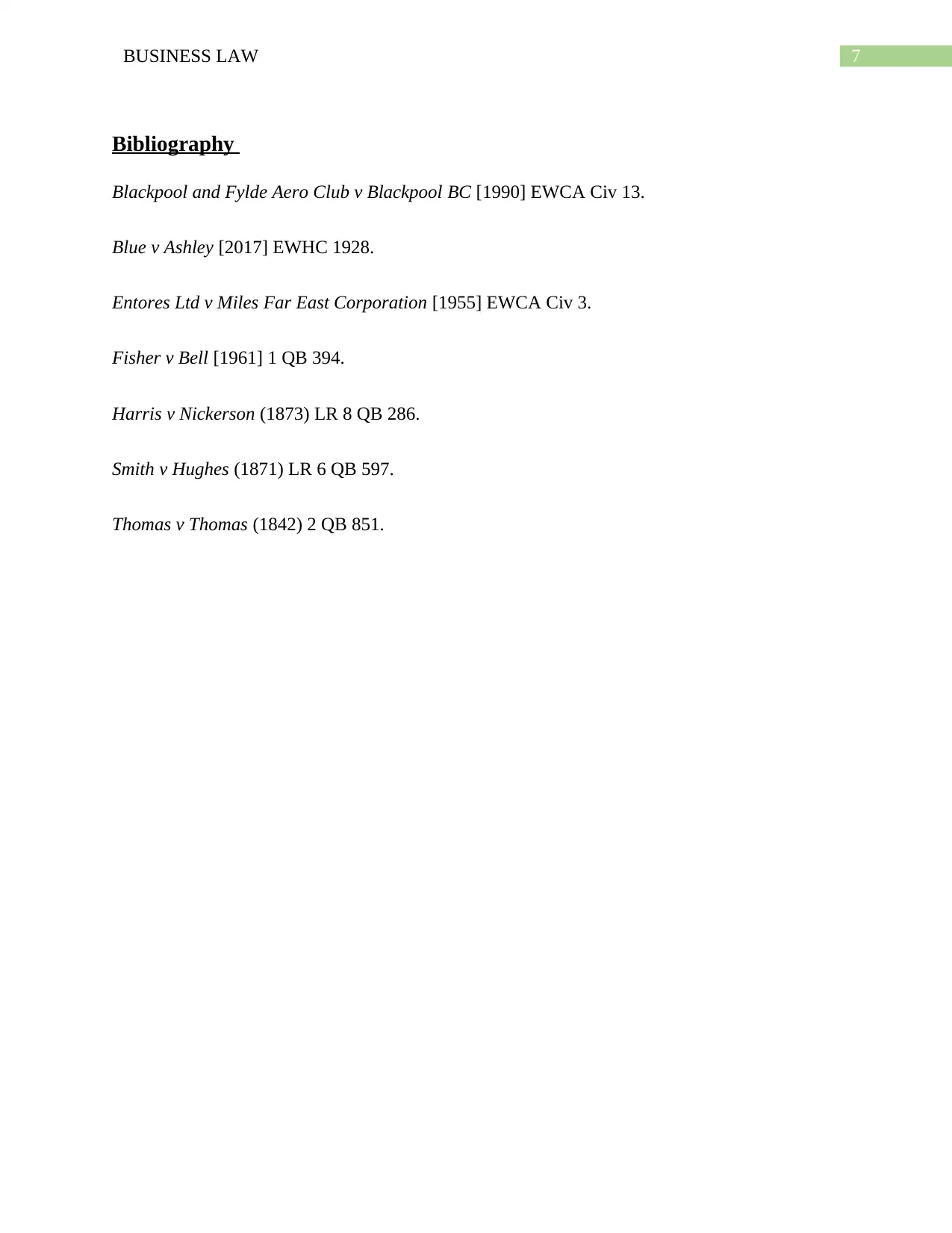
7BUSINESS LAW
Bibliography
Blackpool and Fylde Aero Club v Blackpool BC [1990] EWCA Civ 13.
Blue v Ashley [2017] EWHC 1928.
Entores Ltd v Miles Far East Corporation [1955] EWCA Civ 3.
Fisher v Bell [1961] 1 QB 394.
Harris v Nickerson (1873) LR 8 QB 286.
Smith v Hughes (1871) LR 6 QB 597.
Thomas v Thomas (1842) 2 QB 851.
Bibliography
Blackpool and Fylde Aero Club v Blackpool BC [1990] EWCA Civ 13.
Blue v Ashley [2017] EWHC 1928.
Entores Ltd v Miles Far East Corporation [1955] EWCA Civ 3.
Fisher v Bell [1961] 1 QB 394.
Harris v Nickerson (1873) LR 8 QB 286.
Smith v Hughes (1871) LR 6 QB 597.
Thomas v Thomas (1842) 2 QB 851.
1 out of 8
Related Documents
Your All-in-One AI-Powered Toolkit for Academic Success.
+13062052269
info@desklib.com
Available 24*7 on WhatsApp / Email
![[object Object]](/_next/static/media/star-bottom.7253800d.svg)
Unlock your academic potential
Copyright © 2020–2026 A2Z Services. All Rights Reserved. Developed and managed by ZUCOL.





